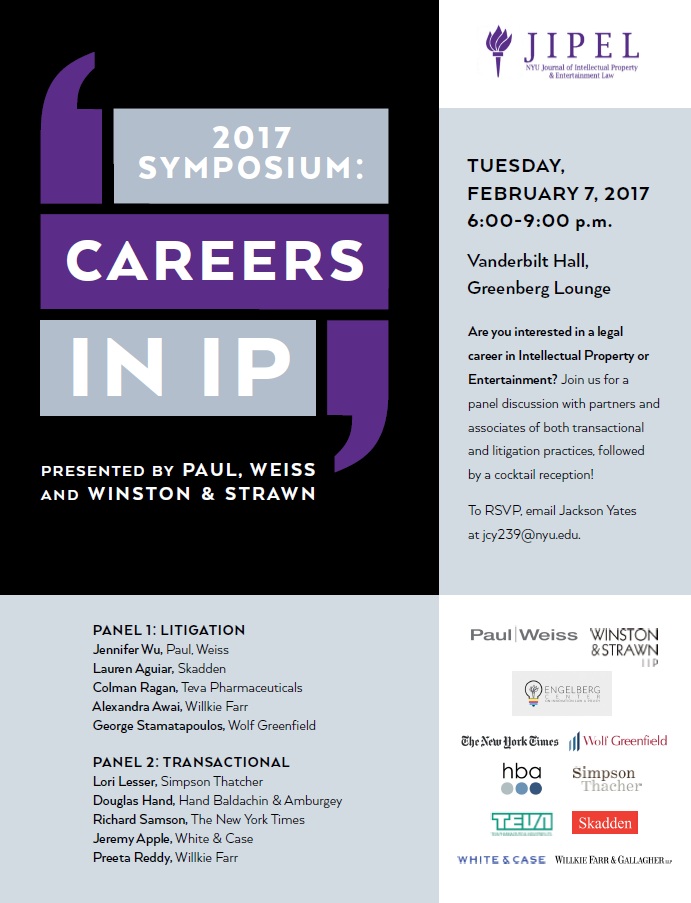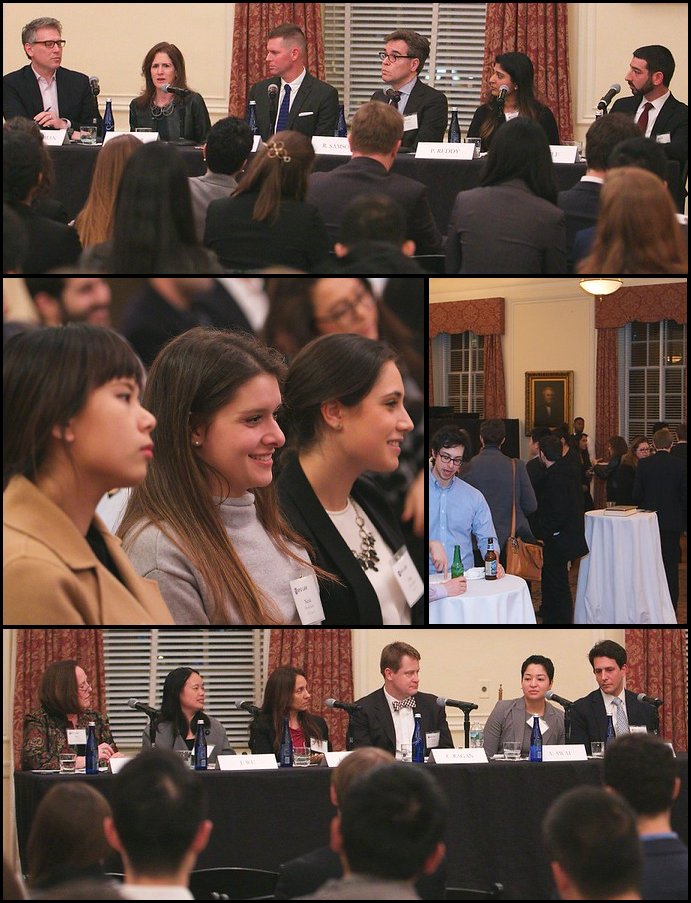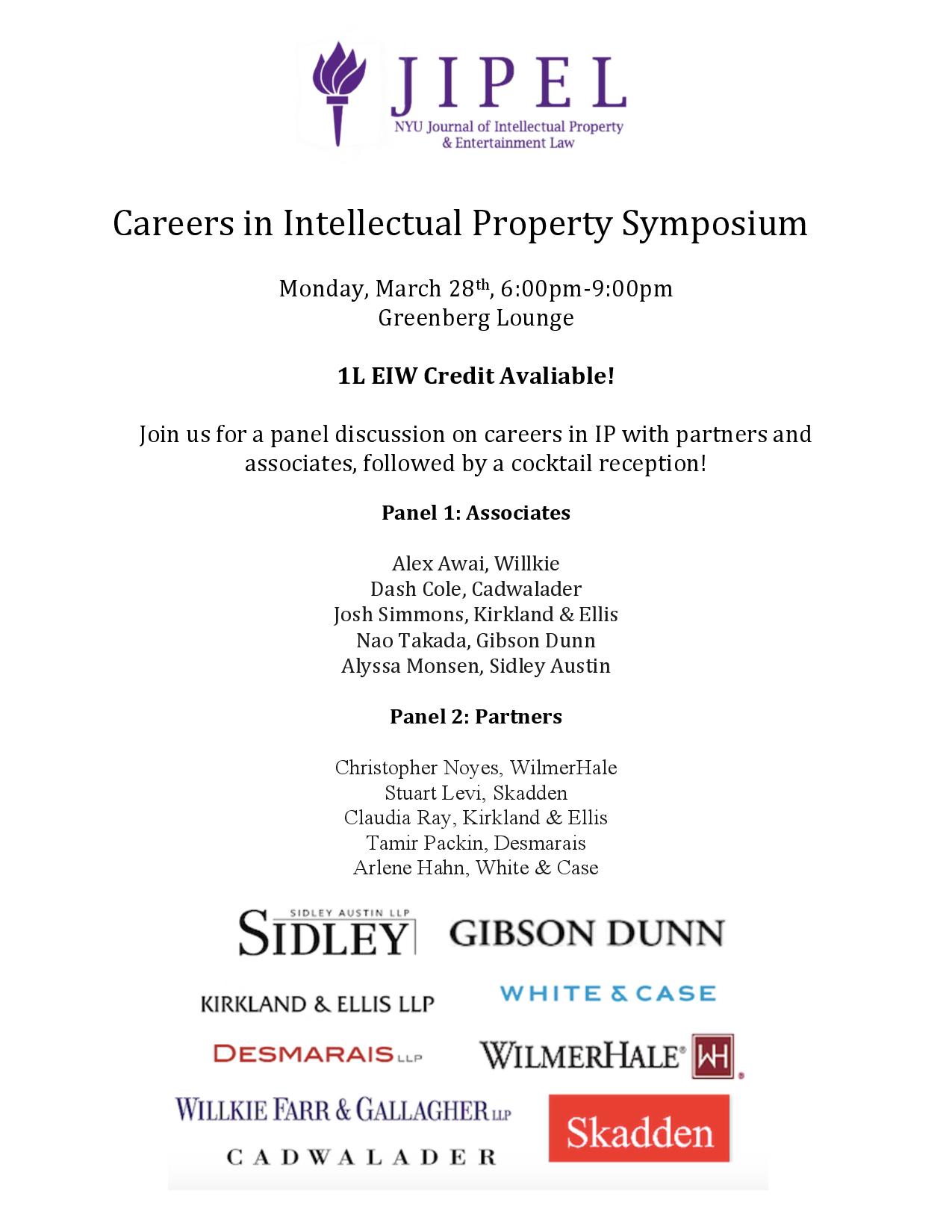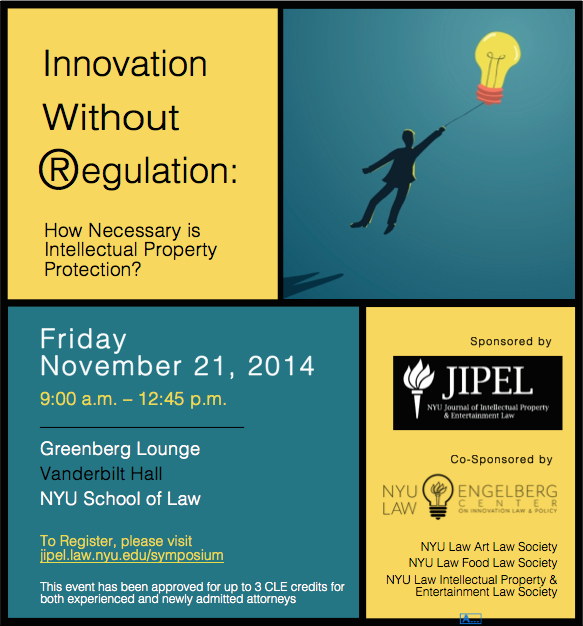Symposium 2023-2024

Our first event was Fireside Chat: History of Labor & Technology.
Our second event was a panel on AI & Its Effects on IP Rights moderated by John Monterubio (Senior Counsel at Loeb & Loeb LLP).
Our third event was a panel on the SAG-AFTRA & WGA Strikes Regarding Union Negotiations & AI, moderated by Olivia R. Singer (Partner at Cohen, Weiss and Simon LLP)
On April 1, 2024, NYU’s Journal of Intellectual Property and Entertainment Law (JIPEL) hosted our annual symposium “Strikes, Camera, Action: The Future of Entertainment in the Age of AI” in collaboration with the Engelberg Center on Innovation Law and Policy (NYU Law). The event was co-sponsored by the Intellectual Property and Entertainment Law Society (IPELS) and Rights Over Tech. The symposium focused on the intersection of technology and the entertainment industry. Specifically, we addressed how technology affects entertainment law by delving into the importance of key negotiating points and consequences of the SAG-AFTRA (The Screen Actors Guild-American Federation of Television and Radio Artists) and WGA (Writers Guild of America) strikes, as well as the current and expected uses of generative AI in entertainment in the context of labor law and right of publicity/likeness rights. The event brought together scholars and practitioners from several fields and perspectives, including experts in labor law, intellectual property, and Artificial Intelligence, as well as members of both unions.
Click here to watch the recording of the event.
Click here to download the symposium flyer with panel information.
Symposium 2022-2023

Despite Indigenous Peoples’ long struggle for sovereignty over their lands, they are often excluded from conversations focused on their “data sovereignty.” In response, the Indigenous Data Sovereignty, or IDSov, movement has emerged to recognize the fundamental rights and interests of Indigenous Peoples relating to the collection, ownership and stewardship of data relating to their communities, knowledge and lands. The multifaceted nature of IDSov gives rise to a broad spectrum of legal and ethical concerns, from data storage, ownership, consent and access, to intellectual property rights and other considerations about how data are used in research, policy and practice.
The event brought together scholars from several fields and perspectives, including Indigenous community leaders, as well as experts in law, public policy, medicine, global health, human genomics, anthropology, sociology, management and marketing. Following each of the four themed sessions, a roundtable discussion with the invited speakers was moderated by a member of the NYU law faculty.
Carlos Andrés Baquero-Díaz (NYU School of Law) moderated our first panel on IDSov and Tribal Codes.
Our second panel on Government Agencies & IDSov was moderated by Professor Jason Shultz (NYU School of Law).
The third panel focused on Labels as Technical Protection Mechanisms and was moderated by Professor Barton Beebe (NYU School of Law).
The last panel, moderated by Professor Florencia Marotta-Wurgler (NYU School of Law), covered Fair Use and IDSov.
On March 1-2, 2023, JIPEL hosted the Indigenous Data Sovereignty Symposium in collaboration with ENRICH and the Engelberg Center on Innovation Law and Policy (NYU Law). This symposium focused on legal and ethical concerns related to the fundamental rights and interests of Indigenous Peoples relating to the collection, ownership and stewardship of data relating to their communities, knowledge and lands. The event brought together scholars from several fields and perspectives, including Indigenous community leaders, as well as experts in law, public policy, medicine, global health, human genomics, anthropology, sociology, management and marketing. Following four themed sessions, a roundtable discussion with the invited speakers was moderated by a member of the NYU law faculty.
Symposium 2021-2022

Since the COVID-19 pandemic, Broadway has taken a serious hit. Theaters closed, shows canceled. The once vibrant and magical place that is known as the Theater District of New York City became silent and dead. After vaccinations were introduced, Broadway also slowly started its reopening process. However, how would the current COVID-19 pandemic impact the reopening and returning of Broadway?
John Breglio (Paul Weiss) moderated our first panel on the impact of COVID and reopening plans for the return of broadway.
Our second panel on diversity issues in theater was moderated by Professor David Glasgow (NYU School of Law).
The third panel focused on the new model of broadway business in the age of COVID-19, which included online streaming of shows. The moderator was Jason Baruch (Sendroff & Baruch).
The last panel, moderated by Lisa Davis (Frankfurt Kurnit), covered intellectual property rights issues in Broadway and considered the tensions between profits vs. access.
On March 25, 2022, JIPEL hosted a symposium titled “The Step Ahead: The Return of Broadway in the Age of Coronavirus.” This symposium focused on various legal issues that might arise in the return of Broadway — either online or in person. We explored these legal issues from different perspectives and different areas of the law.
Symposium 2016-2017

Anne Hassett, the executive director of NYU Law’s Engelberg Center on Innovation Law & Policy, moderated the evening’s first panel, which focused on IP attorneys with litigation practices. The panelists emphasized that many roads lead to IP litigation. Whereas Skadden partner Lauren Aguiar (’95) began her legal career without a definite interest in IP, Wilkie Farr associate Alexandra Awai joked that being an IP attorney had been in her plans since early childhood. The panel also discussed some recurring themes of the litigation practice area. Paul, Weiss partner Jennifer Wu (’04) talked about the challenges of presenting complex and highly technical factual scenarios to lay juries, and Teva Pharmaceutical’s Colman Ragan emphasized a similar challenge in presenting legal issues within the context of a business case to non-lawyer managers and directors. Finally, Gibson Dunn’s George Stamatopoulos (’12) recounted his experience pursuing a JD as a Greek international student with a background in mechanical engineering.

©NYU Photo Bureau: Slezak
The second panel of the evening focused on attorneys with transactional practices, and NYU Professor of Law Christopher Sprigman facilitated discussion. Lori Lesser, the Head of Simpson Thacher’s Intellectual Property Transactions Practice, advised students to be receptive to unplanned opportunities. Indeed, the panelists all agreed that elements of luck and “being in the right place at the right time” played a bigger part in their career trajectories than they had anticipated as law students. Panelists also talked about their experiences developing niche practices. Douglas Hand (’97) described the transition from working as an M&A associate at a big firm to starting his own boutique, Hand Baldachin & Amburgey LLP, which represents clients in the fashion industry. Conversely, White & Case’s Jeremy Apple discussed how his public sector experience in cybersecurity and privacy led him to a position in big law. In addition, Preeta Reddy talked about life as a junior IP associate at Wilkie Farr, and Richard Samson reflected on his work reviewing content for the New York Times as part of its legal team. After a question-and-answer period, the panelists and attendees enjoyed the opportunity to talk further over cocktails and refreshments. All in all, it was lively and informative night for students excited by the prospect of working in IP.
Scheduled Events
Transaction Panel – Moderated by Christopher Jon Sprigman, Professor at NYU Law
JIPEL’s 2017 “Careers in IP Symposium” brought together a broad cross-section of attorneys specializing in intellectual property law. Speakers included both established partners and young associates with experience at large and boutique law firms, as well as in-house counsel for a major pharmaceutical company and the New York Times. The panelists’ collective expertise ranged from concentrations in cybersecurity and data privacy to patent law to fashion law.
Symposium 2015-2016

The associate panel will explore the experience of associates in a law firm. Topics will involve discussion around choosing a firm and practice area, the associates’ experiences, and interesting IP matters they have worked on. This is a great opportunity to showcase the various options a firm can offer associates who are just getting started in their careers from the perspective of attorneys who have already accumulated a few years of experience in the IP field.
The partner panel will feature more established attorneys who will discuss their career trajectory and the most compelling matters they have participated in recently and during their career. Panelists will discuss Careers in IP from the perspective of those who have been in the practice the longest and will offer complex insight into the demands of an ever-changing legal field like IP. The panel will explore the unique challenges the most senior attorneys face as they manage, oversee, mentor, and train attorneys in their practice, while also remaining in the forefront of developing IP matters.
Scheduled Events
- Alexandra Awai; Associate at Willkie Farr & Gallagher
- Dash Cole; Associate at Cadwalader, Wickersham & Taft
- Alyssa Monsen; Associate at Sidley Austin
- Joshua Simmons; Associate at Kirkland & Ellis
- Nao Takada; Associate at Gibson, Dunn & Crutcher
- Arlene Hahn; Partner at White & Case
- Stuart Levi; Partner at Skadden, Arps, Slate, Meagher & Flom
- Christopher Noyes; Partner at WilmerHale
- Tamir Packin; Partner at Desmarais
- Claudia Ray; Partner at Kirkland & Ellis
The purpose of this Symposium is to provide students with a firsthand opportunity to meet practitioners who are respected in their field and to discuss potential career paths in intellectual property. By having one panel with partners and a second with associates, we hope to provide a broad perspective on the opportunities available to students within the field of intellectual property law at various stages of their legal career. This event is geared towards first and second year law students looking for guidance as they begin their career in law, and third year students seeking mentorship in their career trajectory.
Symposium 2014-2015

Scheduled Events
Moderator: Christopher Sprigman; Professor of Law at New York University School of Law Panelists:
- Orin Snyder; Partner at Gibson, Dunn & Crutcher
- Jim Mendrinos; Comedian and Writer
- Daniel Dardani; Technology Licensing Officer at M.I.T.’s Technology Licensing Office
- Jason Schultz; Professor of Clinical Law at New York University School of Law
Moderator: Barbara Kolsun; General Counsel at Stuart Weitzman Panelists:
- Lee Sporn; General Counsel at Michael Kors
- Brandon Sun; Fashion Designer and Founder of Brandon Sun
- Charles C. Valauskas; Founding Partner of Valauskas Corder LLC
- Rebecca Charles; Owner and Head Chef at Pearl Oyster Bar
Presenter: Jessica Silbey; Professor of Law at Suffolk University Law School Moderator: Amy Adler; Emily Kempin Professor of Law at New York University School of Law
Supplemental Materials
“The Piracy Paradox” by Profs. Raustiala & SprigmanAn excerpt from Knockoff Economy by Profs. Raustiala & Sprigman
In addition to these two documents, an excerpt from Jessica Silbey’s upcoming book, The Eureka Myth, was made available in hard copy at the event.
The purpose of the symposium was to address the underlying policy concerns supporting intellectual property regulation in light of varying industry norms and market forces suggesting that such regulation may not be the only source of protection. By establishing a wide-ranging board of presenters, we hoped to provide varying perspectives on the application of intellectual property theories in various creative fields. Our panelists included academics, active practitioners, and creative professionals. The symposium specifically focused on fields either attempting to gain protection under Intellectual Property regulation or operate outside of regulatory protection.
